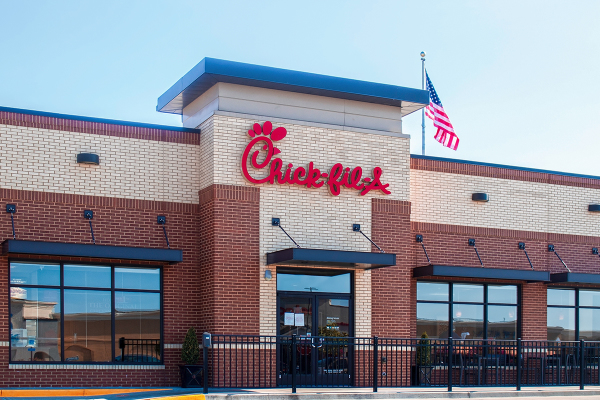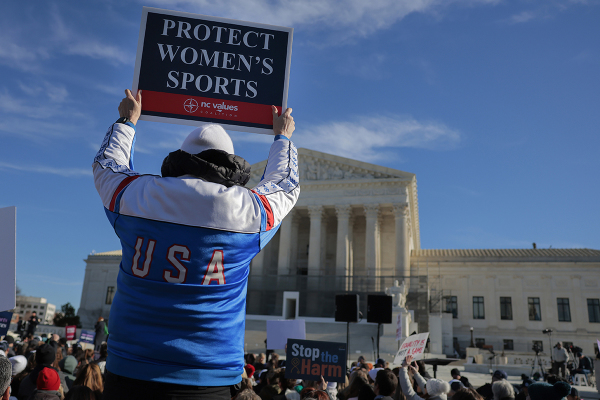Why Two? The Question Gay Activists Cannot Answer

If marriage is not the union of a man and a woman, then why should it be limited to two people (or, for that matter, require two people)? Why can't it be one or three or five? What makes the number "two" so special if it doesn't refer to the union of a male and a female?
I have asked this question for years in various settings, from a campus debate with a professor to social media and from my radio show to writing, and I have not yet received a single cogent answer, since no cogent answer exists.
If "love is love" and "marriage equality" is the mantra, then why can't any combination of loving adults form a "marriage"?
How can anyone in support of same-sex "marriage" object to the goals of the Marriage Equality Blogspot that calls for "Full Marriage Equality," specifically, "for the right of consenting adults to share and enjoy love, sex, residence, and marriage without limits on the gender, number, or relation of participants"?
If you say, "But marriage has always been the union of two people," that is patently false, since polygamy has existed for millennia (and still exists in scores of countries) and, more importantly, throughout history, whatever number of people were involved, the fundamental requirement was not two people but a man and a woman.
If you say, "But polygamy is harmful to women and society," that is irrelevant, since if the people want to enter into marriage love each other (remember, love is love, right?), they should be allowed to.
Plus, polygamists have the ability to reproduce naturally and then join the children to their mother and father, which homosexual unions cannot do. And, speaking of harm, gay relationships are, statistically speaking, less stable than heterosexual relationships, while specific acts of homosexual sex, especially among males, have increased health risks.
Do gay activists really want to press the "harm" angle when it comes to polygamy?
As I wrote back in 2011, "it's a very short leap from polyamory to polygamy, and just as TV shows like Will and Grace helped pave the way for a more gay-affirming society, shows like Big Love and Sister Wives are helping to pave the way for a more polygamy-affirming society.
"Not surprisingly, in Canada, where same-sex marriage is legal throughout the country, Monique Pongracic-Speier, an advocate with the Canadian Civil Liberties Association, has argued on behalf of polygamists that, 'Consenting adults have the right—the Charter protected right—to form the families that they want to form.' If homosexuals can, why can't polygamists?
"The logic really is quite strong: If someone has the 'right to marry the person they love,' as gay activists incessantly tell us, why shouldn't people have the right to marry multiple loving partners?"
That's why it's no surprise that the same day that the Supreme Court ruled to redefine marriage, Politico ran a story titled, "It's Time to Legalize Polygamy: Why group marriage is the next horizon of social liberalism."
And that's why it's no surprise that, within a week of the Supreme Court decision, the internet was buzzing with reports that, "A Montana man said Wednesday that he was inspired by last week's U.S. Supreme Court decision legalizing gay marriage to apply for a marriage license so that he can legally wed his second wife."
As Nathan Collier, the man in question remarked, "It's about marriage equality. You can't have this without polygamy."
Ironically, gay "marriage" advocates like Jonathan Rauch fail to see the irony of their position when they argue that "Polygamy Isn't the Next Gay Marriage," since their redefinition of marriage is far more radical than that of the polygamists.
A man and a woman are physically and biologically designed for each other, carrying within themselves the unique components of sperm and egg (the fact remains that there's no such thing as a baby without a male and female involved), and so the two must come together as one to form a marriage.
The man and woman also share a unique complementarity emotionally and spiritually – have you ever heard the saying that "Men are from Mars and women from Venus"? – which is why the union of a man and woman is special, distinctive, and even sacred. And that's why the union of man and a woman has been recognized as "marriage" throughout the ages.
As cultural analyst Robert Knight remarked, "The term 'marriage' refers specifically to the joining of two people of the opposite sex. When that is lost, 'marriage' becomes meaningless. You can no more leave an entire sex out of marriage and call it 'marriage' than you can leave chocolate out of a 'chocolate brownie' recipe. It becomes something else."
And when it becomes "something else" it can become virtually "anything else," which is why polyamorists (along with polygamists) are also clamoring for their relationships to be legally recognized. As US News and World Report noted just three days after the Supreme Court ruling, "Polyamorous Rights Advocates See Marriage Equality Coming for Them."
That's why Eric Abetz, a senior government minister in Australia, recently warned, "if you undo the definition you then open up a Pandora's box and if you say that it is no longer an institution between one man and one woman you then do open up a Pandora's box."
To repeat, if your mantras are "Love is love" and "I have the right to marry the one I love," and if you really advocate "marriage equality," then why can't any number and combination of consenting adults join together in "marriage"?
If you say, "But that's not marriage," you have just shot yourself in the foot, since marriage has never been the union of any two people but rather the union of a man and a woman.
And so, just as surely as a male plug and a female plug are required to make a connection in the world of electronics, a male and female are required to have a proper marriage. Otherwise, it is not marriage, no matter what any panel of judge's rules.
That's why the fourth principle in my book Outlasting the Gay Revolution is "Refuse to Redefine Marriage," since once you redefine it, you render it meaningless.
So, once again, I ask the question to advocates of "marriage equality": Why two? If marriage is not the union of a man and a woman, then why should it be limited to two people (or, for that matter, require two people)?
I'm not holding my breath.





















